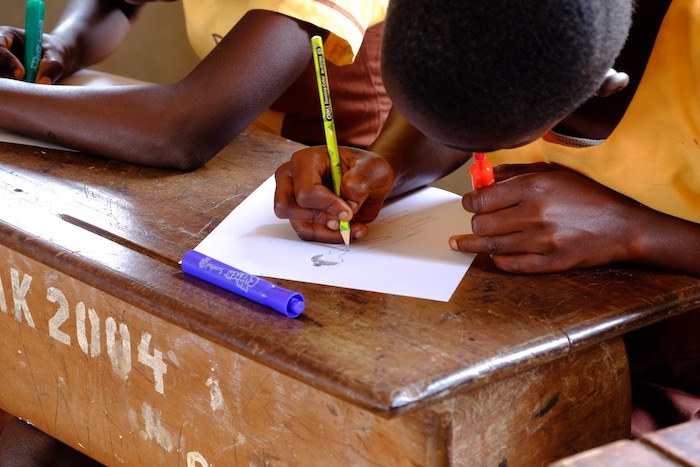“Be a Strong Girl — Know the Facts!” Girls at Simms Senior High Learn More About Reproductive Health

On the 55th anniversary of Ghana’s Republic Day on July 1, 2015, Women’s Health to Wealth used this public holiday to hold the first in its series of Adolescent Reproductive Health Fora (ARHF) for female students of the Simms Senior High School in the Kwabre East district of the Ashanti Region. The theme for the forum was “Be a Strong Girl – Know the Facts!”
The high and unacceptable rates of teenage pregnancy of 99 in 1000 live births in the region, coupled with high rates of complications of unsafe abortions among girls in secondary institutions and the low completion rates of girls in second-cycle institutions in the region, prompted WHW to include the ARHF as one of its strategies to address this menace.
WHW used this opportunity to inform and educate the girls on adolescent reproductive health issues, provide a platform for girls to share problems related to their sexuality, and also to identify girls who would be used as peer educators in the school.
Funding for the program was through the kind support of Women Strong International. WHW partner AmeriCares supported the Forum by providing each girl with a pack of sanitary towels, panty liners and 2 toothbrushes, to improve their personal hygiene. Marie Stopes International also supported the forum, with the donation of 100 branded exercise books, 30 note pads, 100 key holders as souvenirs and 200 handbills on useful reproductive health information for the girls.
Participants
334 female students and 10 tutors from the school, nine facilitators from the WHW Girls Clubs in the Afigya Kwabre and Kwabre East districts, two resource persons each attended the forum from the Ghana Health Service and Marie Stopes International, as well as five staff members of WHW.
What Happened
The Assistant Headmistress, Cassandra Antobre in her address after an opening prayer by Mary Boakye, the Senior House Mistress of Simms, stressed the timeliness and appropriate nature of the forum and urged the students to take advantage of the presence of the resource persons to seek answers to their health and sexuality issues.
The WHW Executive Director, Nana Abenaa Akuamoa-Boateng, gave an overview of WHW’s objectives with regards to female literacy, and she introduced the rest of the invited guests. She shared the statistics based on Demographic and Health Surveys on adolescent reproductive health issues from the global to the local setting, such as teenage pregnancy, contraception, unsafe abortion, anaemia, education, mental health and injuries.
Ms Memuna Yankasa Mahama, a Senior Nutrition Officer of the Ghana Health Service, provided education on nutrition during adolescence. She stressed on the need to eat balanced meals, with emphasis on adequate intake of fruits and vegetables and reduction in fatty and sugary foods.
She stressed on need for routine exercise and talked about good and inexpensive ways, like dancing, walking briskly and jogging where possible.
Mr Peter Titiati, the Regional Coordinator for the Youth Project at Marie Stopes International, addressed the issue of having a positive self-image. He talked about the need for girls to be confident, to have a lot of knowledge and skills, to take pride in who they are, to identify and know what to do in order to boost their confidence, and to always place their education first. It is only then that they can actually control their sexuality.
The girls were given the opportunity to pose questions to the panel. The questions covered a variety of topics from menstruation, sex and sexually transmitted infections (STI), through contraceptives to the issue of sexual abuse by some guardians.
Mr Simeon Acheampong, Regional Manager for Marie Stopes International, also proved to be an invaluable resource during the discussion period, and together with the panel provided concrete and practical responses to questions asked. Several students also interacted with members of the panel on a one-on-one basis after the forum to seek guidance on highly personal issues. Girls with STIs were referred to the Marie Stopes centre for management.
Observations and Findings
– The school does not have an infirmary where girls can go when they are ill;
– The majority of the girls had been given some amount of adolescent reproductive health knowledge from their female teachers, and they had no problems talking about condom use;
– 60% of the questions posed to the panel were related to sexual and contraception issues, 30% were related to menstruation and menstrual issues, 9% were related to candidiasis and the remaining 1% talked about anaemia and its effect on the individual’s studies;
– The panel gave very brief but concrete responses to questions asked by girls;
– A large number of the girls had specific problems they wanted to discuss with the panelists after the program;
– The program was very interesting for the gathering, as the majority of them seemed excited – 21 girls voluntarily registered with WHW to train as peer educators for the school. The training will be organized during the upcoming vacation period, and the trained team will form the nucleus of the WHW Girls’ Club in the school.
Recommendations
After a brief meeting after the forum between the WHW team and the GHS team, the following suggestions were made for subsequent fora:
– More time should be allotted to issues regarding Sexually Transmitted Infections, as most of the questions were focused on sexual issues;
– The time for the program was short, and an additional hour should be added.
Next Steps
– WHW to liaise with the Ghana Health Service to organize the training program for peer educators.
– The Assistant Headmistress to coordinate with WHW on a possible ARHF to take place at Antoa Senior High School before the end of July 2015.
Interested in continuing the conversation about Health and Wellness? Please contribute here.

